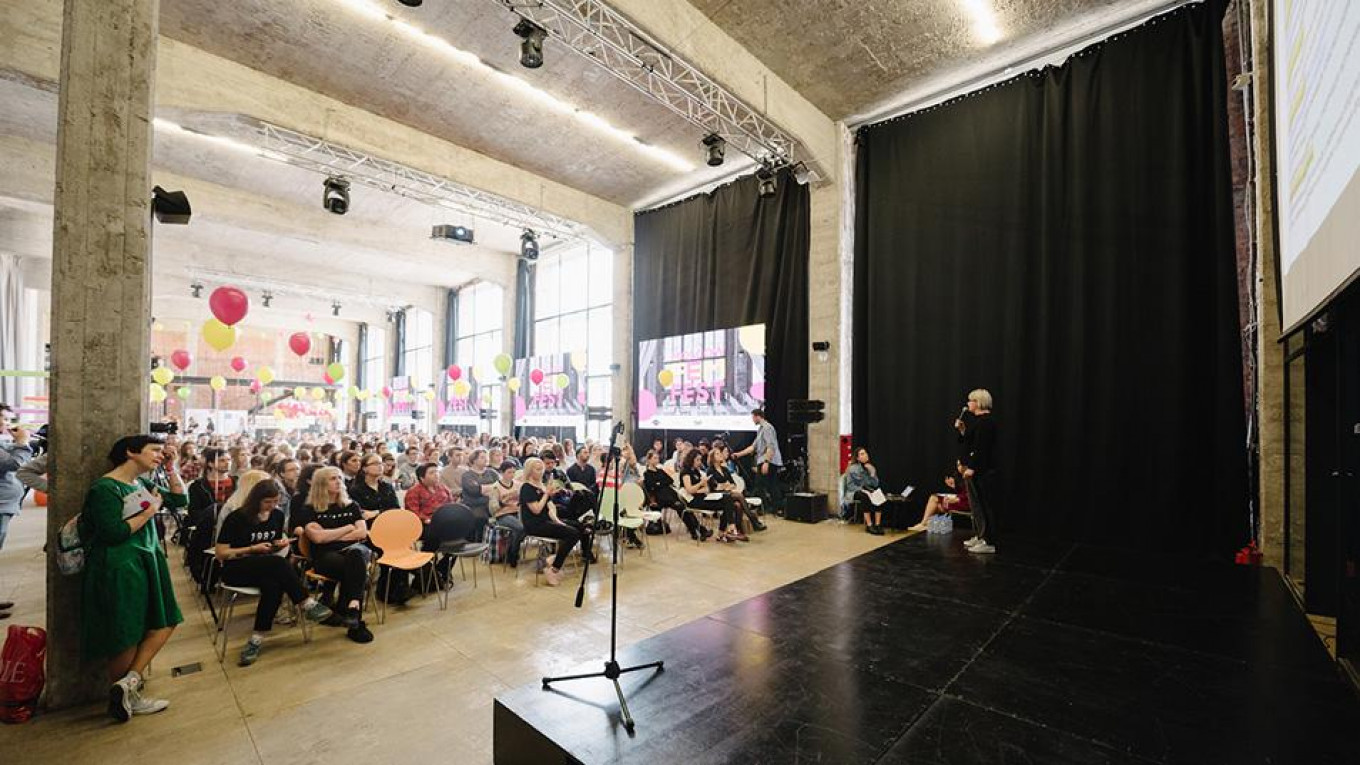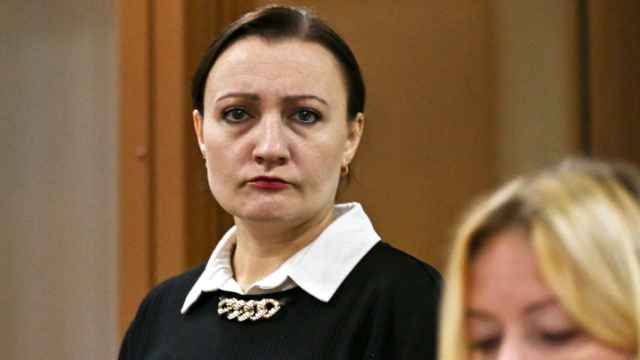Fashionably dressed young Russians mingled in a large hall in central Moscow, decorated with balloons and pink stripes to sip champagne and talk about women’s rights.
Only a year old, FemFest has become the largest feminist event in Russia. Its second iteration last Saturday at the hip Telegraph building attracted some 1,400 participants, around a quarter of whom were men.
The festival was launched last year by Irina Izotova, a gender studies expert, with the help of the Theory and Practice online education platform. Izotova’s aim, she has said, was to introduce Russians to feminist principles to a society not used to openly talking about women’s issues.
While in 2017, the festival aimed to bring feminist ideas to a wider audience, “This year, we wanted to focus more on the public aspect of feminism, like how Russia perceives feminism and how it can attract more people,” Izotova said.
Feminists and feminism are still seen as intimidating, Irina Kosterina, head of the Gender Democracy program at the Heinrich Böll Foundation, said at the opening the festival. “Ordinary Russians see feminism as a man-hating ideology.”
Anna Gorodetskaya, who owns a lingerie shop, told the audience how her business uses ads which don’t sexualize women to promote an alternative narrative. And Nyria Fatichova, coordinator of the Democracy program at the Heinrich Böll Foundation, introduced her new project: a database of female experts in industries dominated by men.
Other speeches discussed gender issues, the future of masculinity and the relationship between women and patriarchal institutions, including the Russian Orthodox Church.
The festival also featured performances, such as extracts from Lidia Russkova's production of “The Vagina Monologues,” a Russian take on the American play of the same name. On stage, several actresses spoke from the perspective of a vagina having sex, visiting the doctor and using hygiene products. “My vagina wants to experience everything!” one of the actresses said.
“It’s great that anyone can come here and learn so much about feminism and about men and women in the modern world,” Femida, 38, a sales manager, told The Moscow Times. “I wish I had access to this kind of festival when I was 25.”
For Yulia, 25, who works in advertising, “feminism is inherent to even the most basic moral code. But people still need help to see this connection, so that’s why these kinds of festivals are important,” she said.
The festival comes at a time when gender equality and women’s rights have come out of the shadow in Russia. Earlier this year, several journalists working in the State Duma accused a lawmaker of sexual misconduct. Although the allegations led to protests and Russian news outlets boycotted the Duma, Leonid Slutsky was cleared of any wrongdoing and received widespread support among his colleagues.
Perhaps not entirely coincidentally, Anna Rivina, head of the project Violence stop, gave a presentation on harassment in the workplace.
But some have argued the festival is not political enough. Last year, members of the feminist community criticized the event over its conciliatory approach and went as far as calling for a boycott.
For Kira, 30, an activist with the feminist group Ona, Russian for “she,” the festival organizers have missed more than a few key points. “They want to be positive, so you won’t hear anything about domestic violence, for example, or discrimination on the labor market,” she told The Moscow Times. “They want to avoid politics.”
Izotova, the founder, appeared unfazed by the criticism. “Our festival provides a platform for a variety of voices and we have never banned anyone from taking part,” she said. “Last year, some activists just decided not to participate in our festival, and we respect their choice.”
As the event was drawing to a close, Vasily, a 21-year-old student, expressed disappointment that there was not enough of practical information. “I have been here all day and I didn’t find out what constitutes harassment, for example,” he told The Moscow Times.
But Yana Chernova, a gender studies expert at the Higher School of Economics, senses a gender revolution bubbling in Russia.
“Russian girls are seeing firsthand all the disadvantages of how women are treated in Russia,” she told the audience. “And when they grow up, they will want a different future for themselves.”
A Message from The Moscow Times:
Dear readers,
We are facing unprecedented challenges. Russia's Prosecutor General's Office has designated The Moscow Times as an "undesirable" organization, criminalizing our work and putting our staff at risk of prosecution. This follows our earlier unjust labeling as a "foreign agent."
These actions are direct attempts to silence independent journalism in Russia. The authorities claim our work "discredits the decisions of the Russian leadership." We see things differently: we strive to provide accurate, unbiased reporting on Russia.
We, the journalists of The Moscow Times, refuse to be silenced. But to continue our work, we need your help.
Your support, no matter how small, makes a world of difference. If you can, please support us monthly starting from just $2. It's quick to set up, and every contribution makes a significant impact.
By supporting The Moscow Times, you're defending open, independent journalism in the face of repression. Thank you for standing with us.
Remind me later.






